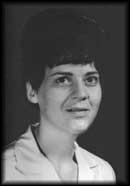
Freida J. Riley
Coalwood, WV
Big Creek High School
Grades: HS
Science, Math, Chemistry, Physics
Taught in the 50's and 60's
Registered by: Andrew R. on December 1, 2005
Freida J. Riley is a perfect example of the impact a teacher can have for the cause of good. After teaching for only a few years with Hodgkin's disease, Miss Riley passed away. But in that short time she reached far enough to inspire some of America's best scientists, including Homer Hickam and the Rocket Boys - whom the touching film 'October Sky' was based on. It was her encouragement that brought these boys into manhood as believers in knowledge and hard-work. Homer, who wrote a book about how Miss Riley gave him the direction he needed to achieve great things, became a rocket scientist for NASA. Miss Riley embodies the goodness of American teachers who push their students to accomplish their dreams.
Homer Hickam has sent us his remarks:
"A few years ago, I wrote a memoir titled Rocket Boys which has since gone on to become a classic. Rocket Boys (from which the film October Sky was based) is about life in a West Virginia coal town during the 1950's and centered on my high school days when some friends and I decided to become rocket-builders. One of the folks I wrote about was our chemistry and physics teacher, a young woman named Freida Joy Riley. Because of the book and movie, Miss Riley, as we knew her, has taken on near-icon status amongst teachers across the nation and the world. Wherever I go, I am thanked by people of all walks of life, but especially by teachers, for telling her story. At long last, they say, someone has written about a real school teacher, one who not only fought for her students, but insisted that they learn.
In Rocket Boys, I quote Miss Riley as saying, "All I've done is give you a book. You have to have the courage to learn what's inside it." She had just provided me with a book about rockets that required a thorough knowledge of calculus and differential equations to understand. Although I was having trouble with algebra at the time, Miss Riley believed in me and so I believed in myself.
Miss Riley was not an easy teacher. She was a tough teacher. She gave lots of homework and required each of us to arrive in class prepared and ready to discuss the day's lessons. Miss Riley paid attention to all her students, not just her missile-building boys. She was fierce in her belief that going to school was the job of her students and, therefore, sacred. To do a poor job was simply not acceptable. When I got arrogant because of my rocket successes, or in trouble for my failures, she kept me on an even keel with just a few words of appropriate encouragement and a form of tough love. Even when she was diagnosed with Hodgkin's Lymphoma, she never stopped teaching. At the last, she was carried by stretcher to her classroom.
Miss Riley died while I was on military duty overseas. When I found out, I wished then that I had told her how much she meant to me. At least, I was able to do that retroactively in Rocket Boys. I am most happy that she lived long enough to see Neil Armstrong step on the moon. I trust she thought of her Rocket Boys when he did."
